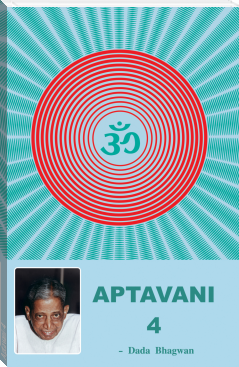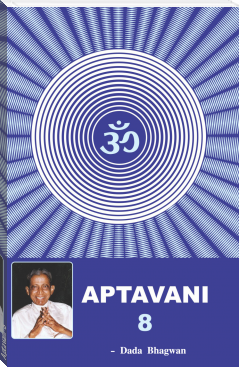Among the Forces by Henry White Warren (no david read aloud .TXT) 📖

Download in Format:
- Author: Henry White Warren
Book online «Among the Forces by Henry White Warren (no david read aloud .TXT) 📖». Author Henry White Warren
dense cloud forms along the path of the sunbeam; creation is going on. What the sun may do in the thinner vapors the world goes into when burned up will be for us to find out when we get there. Standing on Popocatepetl we have seen a sea of clouds below, white as the light of transfiguration, tossed into waves a mile high by the touch of the sunbeam. Creative ordering was observed in actual process. It is done under our eyes to show us how easy it is. Would it be any less glorious if there were no Popocatepetl? A thrush among vines outside is just now showing us how easy it is to create an ecstasy of music out of silence. She has only to open her mouth and the innate aptitudes of air rush in to actualize her creative wish. Not only is it easy for the bird, but she is even provoked to this love and good works by the creation of a rainbow on the retreating blackness of a storm yonder. Thunder is the sub-bass nature furnishes her, and thus invites her to add the complementary notes.
Some one may think that all this tenuity is as vaporous as the stuff that dreams are made of, and call for solid rocks for foundations. Perhaps we may so call while we have material bodies of two hundred pounds' weight. Yet even these bodies are delicate enough to be valuable to us solely because they have the utmost chemical stability. We are burning up their substance with every breath in order to have delicacy of feeling and thought. What were a wooden body worth? Substances are valuable to us according to their fineness and facility of change. Even iron is mobile in all its particles. We call it solid, but it is not. We lift our eyes from this writing and behold the tumbling surf of the great Pacific sea. Line after line of its billows are charging on the shore and tumbling in utmost confusion and roar of advancing and refluent waves. So the iron of the telephone wire. You often hold the receiver to your ear listening, not to the voice of business or friendship of men, but to the gentle hum of the rolling surf in the wire's own substance. And, in order that we may know the essential stability of things that are fine, we are told that the city which hath enduring foundations is in the spirit world, not this kind of material. The whole new Jerusalem to come down "out of heaven, prepared as a bride adorned for her husband," is as movable as a train of cars is movable here. There may still be rainbows and rivers of life if there are no more rocks. There is a real realm of "scientific imagination." But all our imaginings fall far short of realities. Some men do not desire this realm, and demand solid rocks to walk on. But a bird does not. He oars himself along the upper fields and rides on air. So does a bicyclist and balloonist. Some men have a sort of contempt for aeronauts and workers at flying machines. That feeling is a testimony to their depravity and groveling tendencies. Aeronautics and nautics are an effort toward angelhood. Men can walk water who are willing to take a boat for an overshoe. So we may air when we get the right shoe. Browning gives us a delicious sense of being amphibian as we swim. And the butterfly, that winged rather than rooted flower, looking down upon us as we float, begets in us a great longing to be polyphibian. We have innate tendencies toward a life of finer surroundings, and we shall take to them with zest, if we are not too much of the earth earthy. We were designed for this finer life. We do take to it even now in the days of our deterioration, not to say depravity. The great marvels of the world are not so much in matter as in man. We were meant to be more sensitive to finer influences than we are. We are far more so than we think. Take your child into the street. Another child coughs at a window on the other side, and your child has three months of terrific whooping-cough. All such diseases are taken by homeopathic doses of the millionth dilution. Many people feel "in their bones" the coming of storms days before their arrival. We knew a man who ate honey with delight till he was twenty-five years old, and then could do so no more. This peculiarity he inherited from his father. One man has an insatiable desire for drink because some ancestor of his, back in the third or fourth generation, bequeathed him that curse. In the South you can go a mile in the face of the wind and find that peerless blossom of a magnolia by following the drift of its far-reaching odor. Who has not received a letter and knew before opening it that it had violets within? It had atmosphered itself with rich perfume, and something far richer, for three thousand miles. The first influences which came over the Atlantic cable were so feeble that a sleeping infant's breath were a whirlwind in comparison. But they were read. It is no wonder that the old astrologers thought that men's whole lives were influenced by the stars. Every vegetable life, from the meanest flower that blows to the largest tree, has its whole existence shaped by the sun. Doubtless man's body was meant to be an Aeolian (how the vowels and liquids flow into the very name!) harp of a thousand strings over which a thousand delicate influences might breathe. Soul was meant to be sensitive to the influences of the Spirit. This capability has been somewhat lost in our deterioration. To recover these finer faculties men are required to die. And for the field of exercising them the world must be changed. Paul understood this. He associated some sort of perfection with the resurrection, with the buying back of the powers of the body. And the whole creation waiteth for the apocalypse of the full-sized sons of God.
Does one fear the change from gross to fine, from force of freezing to the winged energy of steam, from solid zinc to lightning? Our whole desire for education is a desire for refining influences. We know there is a higher love for country than that begotten by the fanfare of the Fourth of July. There is a smile of joy at our country's education and purity finer than the guffaws provoked by hearing the howls of a dog and the explosions of firecrackers when the two are inextricably mixed. There is a flame of religious love when the heart sacrifices itself in humble realization of the joy of its adorable love purer than the fierce fire of the hating heart that applies the torch to the martyr's pyre. We give our lives to seeking these higher refinements because they are stronger and more like God.
Does one fear to leave bodily appetites and passions for spiritual aptitudes fitted to finer surroundings? He should not. Man has had two modes of life already--one, slightly conscious, closely confined, peculiarly nourished, in the dark, without the possible exercise of any one of the five senses. That is prenatal. He comes into the next life. At once he breathes, often vociferously, looks about with eyes of wonder, nourishes himself with avidity, is fitted to his new surroundings, his immensely wider life, and finds his superior companions and surroundings fitted to him, even to his finest need for love. Why hesitate for a third mode of life? He loses modes of nourishment; so he has before. He loses relations to former life; so he has before. He comes into new companionships and surroundings; so he has before. But each time and in every respect his powers, possibilities, and field have been immensely enlarged.
O the hour when this material
Shall have vanished like a cloud,
When amid the wide ethereal
All the invisible shall crowd.
In that sudden, strange transition,
By what new and finer sense
Shall we grasp the mighty vision,
And receive the influence?
Knowledge of the third state of man is not so difficult to attain in the second as knowledge of the second was in the first. If a fit intelligence should study a specimen of man about to emerge from its first stage of existence, it could judge much of the conditions of the second. Feet suggest solid land; lungs suggest liquid air; eyes, light; hands, acquisitiveness, and hence dominion; tongue, talk, and hence companions, etc. What fore-gleams have we of the future life? They are from two sources--revelation and present aptitudes not yet realized. What feet have we for undiscovered continents, what wings for wider and finer airs, what eyes for diviner light? Everything tells us that such aptitudes have fit field for development. The water fowl flies through night and storm, lone wandering but not lost, straight to the south with instinct for mild airs, food, and a nest among the rushes. It is not disappointed.
Man has an instinct for dominion which cannot be gratified here. He weeps for more worlds to conquer. He is only a boy yet, getting a grip on the hilt of the sword of conquest, feeling for some Prospero's wand that is able to command the tempest. When he gets the proper pitch of power, take away his body, and he is, as Richter says, no more afraid, and he is also free from the binding effect of gravitation. Then there are worlds enough, and every one a lighthouse to guide him to its harbor. They all seek a Columbus with more allurements than America did hers. Dominion over ten cities is the reward for faithfulness in the use of a single talent.
Man has an instinct for travel and speed. To travel a couple of months is a sufficient reward for a thousand toilful days. He earnestly desires speed, develops race horses and bicycles to surpass them, yachts, and engines. Not satisfied with this, he harnesses lightning that takes his mind, his thought, to the ends of the earth in a twinkling. But he is stopped there. How he yearns to go to the moon, the sun, and stars! But he could not take his present body through the temperatures of space three or four hundred degrees below zero. So he must find a way of disembodying and of attachment to some force swift as lightning, of which there are plenty in the spaces when the world has ceased to be a world. It is all provided for by death.
Man has an instinct for knowledge not gratified nor gratifiable in the present narrow bounds that hedge him in like walls of hewn stone. A thousand questions he cannot solve about himself, his relations to others and to the world about him, beset him here. There he shall know even as he is known by perfect intelligence.
Here he has an instinct for love
Some one may think that all this tenuity is as vaporous as the stuff that dreams are made of, and call for solid rocks for foundations. Perhaps we may so call while we have material bodies of two hundred pounds' weight. Yet even these bodies are delicate enough to be valuable to us solely because they have the utmost chemical stability. We are burning up their substance with every breath in order to have delicacy of feeling and thought. What were a wooden body worth? Substances are valuable to us according to their fineness and facility of change. Even iron is mobile in all its particles. We call it solid, but it is not. We lift our eyes from this writing and behold the tumbling surf of the great Pacific sea. Line after line of its billows are charging on the shore and tumbling in utmost confusion and roar of advancing and refluent waves. So the iron of the telephone wire. You often hold the receiver to your ear listening, not to the voice of business or friendship of men, but to the gentle hum of the rolling surf in the wire's own substance. And, in order that we may know the essential stability of things that are fine, we are told that the city which hath enduring foundations is in the spirit world, not this kind of material. The whole new Jerusalem to come down "out of heaven, prepared as a bride adorned for her husband," is as movable as a train of cars is movable here. There may still be rainbows and rivers of life if there are no more rocks. There is a real realm of "scientific imagination." But all our imaginings fall far short of realities. Some men do not desire this realm, and demand solid rocks to walk on. But a bird does not. He oars himself along the upper fields and rides on air. So does a bicyclist and balloonist. Some men have a sort of contempt for aeronauts and workers at flying machines. That feeling is a testimony to their depravity and groveling tendencies. Aeronautics and nautics are an effort toward angelhood. Men can walk water who are willing to take a boat for an overshoe. So we may air when we get the right shoe. Browning gives us a delicious sense of being amphibian as we swim. And the butterfly, that winged rather than rooted flower, looking down upon us as we float, begets in us a great longing to be polyphibian. We have innate tendencies toward a life of finer surroundings, and we shall take to them with zest, if we are not too much of the earth earthy. We were designed for this finer life. We do take to it even now in the days of our deterioration, not to say depravity. The great marvels of the world are not so much in matter as in man. We were meant to be more sensitive to finer influences than we are. We are far more so than we think. Take your child into the street. Another child coughs at a window on the other side, and your child has three months of terrific whooping-cough. All such diseases are taken by homeopathic doses of the millionth dilution. Many people feel "in their bones" the coming of storms days before their arrival. We knew a man who ate honey with delight till he was twenty-five years old, and then could do so no more. This peculiarity he inherited from his father. One man has an insatiable desire for drink because some ancestor of his, back in the third or fourth generation, bequeathed him that curse. In the South you can go a mile in the face of the wind and find that peerless blossom of a magnolia by following the drift of its far-reaching odor. Who has not received a letter and knew before opening it that it had violets within? It had atmosphered itself with rich perfume, and something far richer, for three thousand miles. The first influences which came over the Atlantic cable were so feeble that a sleeping infant's breath were a whirlwind in comparison. But they were read. It is no wonder that the old astrologers thought that men's whole lives were influenced by the stars. Every vegetable life, from the meanest flower that blows to the largest tree, has its whole existence shaped by the sun. Doubtless man's body was meant to be an Aeolian (how the vowels and liquids flow into the very name!) harp of a thousand strings over which a thousand delicate influences might breathe. Soul was meant to be sensitive to the influences of the Spirit. This capability has been somewhat lost in our deterioration. To recover these finer faculties men are required to die. And for the field of exercising them the world must be changed. Paul understood this. He associated some sort of perfection with the resurrection, with the buying back of the powers of the body. And the whole creation waiteth for the apocalypse of the full-sized sons of God.
Does one fear the change from gross to fine, from force of freezing to the winged energy of steam, from solid zinc to lightning? Our whole desire for education is a desire for refining influences. We know there is a higher love for country than that begotten by the fanfare of the Fourth of July. There is a smile of joy at our country's education and purity finer than the guffaws provoked by hearing the howls of a dog and the explosions of firecrackers when the two are inextricably mixed. There is a flame of religious love when the heart sacrifices itself in humble realization of the joy of its adorable love purer than the fierce fire of the hating heart that applies the torch to the martyr's pyre. We give our lives to seeking these higher refinements because they are stronger and more like God.
Does one fear to leave bodily appetites and passions for spiritual aptitudes fitted to finer surroundings? He should not. Man has had two modes of life already--one, slightly conscious, closely confined, peculiarly nourished, in the dark, without the possible exercise of any one of the five senses. That is prenatal. He comes into the next life. At once he breathes, often vociferously, looks about with eyes of wonder, nourishes himself with avidity, is fitted to his new surroundings, his immensely wider life, and finds his superior companions and surroundings fitted to him, even to his finest need for love. Why hesitate for a third mode of life? He loses modes of nourishment; so he has before. He loses relations to former life; so he has before. He comes into new companionships and surroundings; so he has before. But each time and in every respect his powers, possibilities, and field have been immensely enlarged.
O the hour when this material
Shall have vanished like a cloud,
When amid the wide ethereal
All the invisible shall crowd.
In that sudden, strange transition,
By what new and finer sense
Shall we grasp the mighty vision,
And receive the influence?
Knowledge of the third state of man is not so difficult to attain in the second as knowledge of the second was in the first. If a fit intelligence should study a specimen of man about to emerge from its first stage of existence, it could judge much of the conditions of the second. Feet suggest solid land; lungs suggest liquid air; eyes, light; hands, acquisitiveness, and hence dominion; tongue, talk, and hence companions, etc. What fore-gleams have we of the future life? They are from two sources--revelation and present aptitudes not yet realized. What feet have we for undiscovered continents, what wings for wider and finer airs, what eyes for diviner light? Everything tells us that such aptitudes have fit field for development. The water fowl flies through night and storm, lone wandering but not lost, straight to the south with instinct for mild airs, food, and a nest among the rushes. It is not disappointed.
Man has an instinct for dominion which cannot be gratified here. He weeps for more worlds to conquer. He is only a boy yet, getting a grip on the hilt of the sword of conquest, feeling for some Prospero's wand that is able to command the tempest. When he gets the proper pitch of power, take away his body, and he is, as Richter says, no more afraid, and he is also free from the binding effect of gravitation. Then there are worlds enough, and every one a lighthouse to guide him to its harbor. They all seek a Columbus with more allurements than America did hers. Dominion over ten cities is the reward for faithfulness in the use of a single talent.
Man has an instinct for travel and speed. To travel a couple of months is a sufficient reward for a thousand toilful days. He earnestly desires speed, develops race horses and bicycles to surpass them, yachts, and engines. Not satisfied with this, he harnesses lightning that takes his mind, his thought, to the ends of the earth in a twinkling. But he is stopped there. How he yearns to go to the moon, the sun, and stars! But he could not take his present body through the temperatures of space three or four hundred degrees below zero. So he must find a way of disembodying and of attachment to some force swift as lightning, of which there are plenty in the spaces when the world has ceased to be a world. It is all provided for by death.
Man has an instinct for knowledge not gratified nor gratifiable in the present narrow bounds that hedge him in like walls of hewn stone. A thousand questions he cannot solve about himself, his relations to others and to the world about him, beset him here. There he shall know even as he is known by perfect intelligence.
Here he has an instinct for love
Free ebook «Among the Forces by Henry White Warren (no david read aloud .TXT) 📖» - read online now
Similar e-books:





Comments (0)